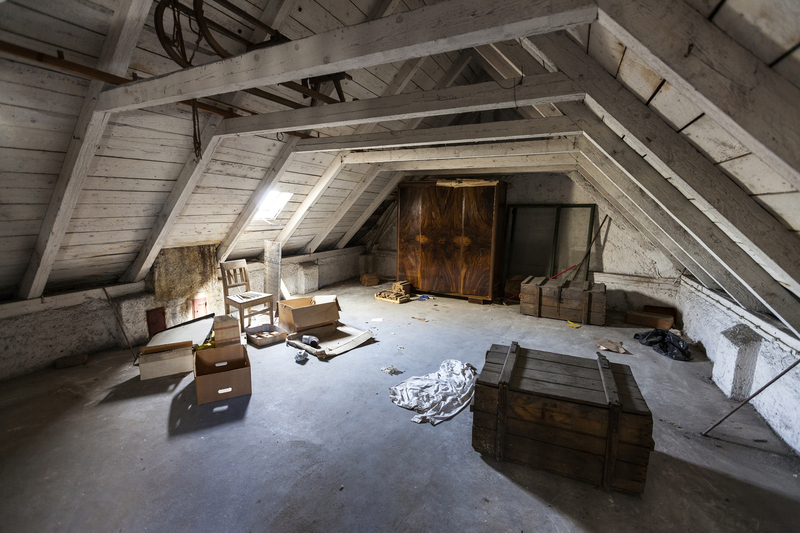Achieve Spotless Floors with These Cleaning Strategies
Posted on 14/06/2025
Achieve Spotless Floors with These Cleaning Strategies
In any home or business, sparkling clean floors set the tone for the entire space. Achieving spotless floors isn't just about appearances--it's about maintaining hygiene, increasing longevity, and ensuring the safety of everyone who walks through your door. But, with daily foot traffic, spills, dust, and grime, keeping floors immaculate can seem like a daunting task.
In this comprehensive, SEO-optimized guide, we'll uncover the best floor cleaning strategies for every type of flooring. With the right techniques, products, and a bit of know-how, you'll have fresh, gleaming floors that impress.

Understanding Your Flooring Type: The First Step to Spotless Floors
Before jumping into the actionable tips, it's important to identify your flooring type. Every floor has unique qualities and requirements for optimal care. When you clean floors using methods that complement their material, you not only achieve a flawless finish but also extend their lifespan.
- Hardwood: Natural, elegant, but vulnerable to moisture and scratches.
- Laminate: Durable and cost-effective, yet sensitive to water.
- Tile: Robust and easy to maintain but grout can become stained.
- Vinyl: Resilient, stain-resistant, and easy to clean.
- Carpet: Comfortable and warm but traps dirt, allergens, and spills.
- Natural Stone: Luxurious yet porous and requires gentle cleaning solutions.
Let's explore the best floor cleaning methods for each type.
The Ultimate Floor Cleaning Guide: Strategies for Every Surface
Hardwood Floor Cleaning Techniques
Hardwood floors bring beauty and warmth, but keeping them spotless means you need to use the right approach and products.
- Regular Dusting: Use a microfiber mop or broom daily. Microfiber traps dust and grit, preventing scratches.
- Damp Mopping: Clean weekly with a slightly damp mop--not wet. Too much water can damage hardwood.
- pH-Neutral Cleaners: Select products specifically designed for wood. Avoid vinegar, ammonia, or harsh chemicals.
- Stain Removal: For sticky residues, apply a wood-safe cleaner to a soft cloth and gently rub the spot.
- Preventative Care: Place mats at entrances and felt pads under furniture to avoid scuffs.
Remember, for flawless hardwood floors, avoid excess moisture and always wipe up spills immediately.
Tile Floor Cleaning Strategies
Tiles--ceramic, porcelain, or stone--are popular due to their resilience. Yet, their grout lines require special attention.
- Sweeping or Vacuuming: Remove debris daily to prevent scratching and dullness.
- Warm Water Mop: A simple mop with warm water keeps tiles looking great. For deeper cleaning, add a few drops of mild detergent.
- Grout Focus: Clean grout lines with a small brush and a paste of baking soda and water. Let it sit before scrubbing, then rinse.
- Rinse Thoroughly: Avoid sticky residues by rinsing with clean water after mopping.
Achieve that spotless tile floor by treating the grout regularly and avoiding strong acids that can erode the surface.
Laminate Floor Cleaning Solutions
Laminate floors mimic wood but are more affordable and scratch-resistant. However, excess water can seep into seams and cause swelling.
- Dry Dusting: Use a dry microfiber mop; avoid wet mopping to protect seams.
- Slightly Damp Mop: When deeper cleaning is needed, use a damp (not wet) mop and laminate-safe cleaner.
- Stain Removal: Clean up spills immediately with a dry cloth; use acetone (nail polish remover) for stubborn marks like ink or lipstick.
- No Wax or Polish: Never use wax, as it will dull the finish and cause streaks.
Laminated floors stay spotless when you avoid standing water and harsh, abrasive tools.
Vinyl Flooring Care and Cleaning
Vinyl floors are resilient and low-maintenance, making them a favorite in kitchens and bathrooms.
- Sweep and Vacuum: Eliminate dirt and grit daily to prevent scratches.
- Gentle Mopping: Use a mop with warm water and a few drops of dish soap.
- Tough Stains: Try a soft brush and a baking soda paste for patches of grime.
- No Abrasive Scrubbers: Avoid steel wool or stiff brushes that scratch vinyl surfaces.
With the above steps, you'll achieve pristine vinyl floors that always look new.
Carpet and Rug Cleaning Tactics
Carpets hide dust, allergens, and dander, demanding special cleaning routines for a spotless look.
- Daily Vacuuming: Especially in high-traffic areas. Use a vacuum with HEPA filters to trap allergens.
- Spot Cleaning: Address spills immediately with blotting, not rubbing. Use carpet-specific cleaners for stains.
- Periodic Deep Cleaning: Extract deeply embedded dirt using a carpet shampooer or steam cleaner, at least every 6-12 months.
- Professional Help: Schedule professional carpet cleaning annually for best results.
For meticulously clean carpets, consistent vacuuming and immediate action are key.
Natural Stone Floor Maintenance
Marble, granite, slate, and other natural stones have special care requirements to prevent dullness and etching.
- Dry Dusting: Use a pH-neutral cleaner and a soft mop or cloth.
- Avoid Harsh Chemicals: Acids (vinegar, lemon) can etch and damage the stone's surface.
- Seal Surfaces: Stone floors should be sealed periodically to protect against stains and moisture.
- Spot Cleaning: Use only recommended stone cleaners and avoid scrubbing pads.
With these stone floor cleaning strategies, your natural stone will maintain its luxurious shine for years.
Expert Tips for Achieving Flawless, Spotless Floors
Beyond basic cleaning, impeccable floors require attention to technique and detail. Here are professional strategies to take your results to the next level.
1. Establish a Regular Cleaning Routine
- Daily: Sweep or vacuum. Address spills promptly to prevent stains and damage.
- Weekly: Mop and spot clean, focusing on high-traffic areas.
- Monthly: Deep clean and treat grout or difficult stains.
Consistency makes it simple to maintain spotless floors without heavy scrubbing.
2. Use Floor Mats and Area Rugs
- Entryway Mats: Capture dirt and grit from shoes right at the entrance.
- Rugs in High Traffic Areas: Add rugs where there's constant foot traffic to protect the floor surface.
Keeping debris out helps floors stay spotless longer and minimizes cleaning time.
3. Choose the Right Cleaning Tools
- Microfiber Mops: Attract dust and dirt efficiently.
- Soft Bristle Brooms: Gentle enough for delicate surfaces, yet effective.
- High Filtration Vacuums: Especially for carpets, to remove allergens and fine dust.
The correct tools can make all the difference for effortless floor cleaning.
4. Opt for Green and Non-Toxic Cleaners
- Homemade Solutions: Use diluted dish soap or a mix of vinegar and water for most hard floors (except natural stone).
- Eco-Friendly Commercial Products: Look for biodegradable ingredients that don't leave toxic residues.
Your floors will be clean and safe for both pets and children.
5. Address Stains and Spills Immediately
Speed matters for stain removal. Blot liquid stains with a clean, absorbent cloth--never rub, which can spread the spill. For solid spills, gently scoop up and clean with recommended solutions.
6. Preventative Maintenance for Long-Term Spotlessness
- Felt Pads: Attach to furniture legs to prevent scratches and denting.
- Shoe-Free Policy: A strict no-shoes policy drastically reduces dirt indoors.
- Humidity Control: Use a dehumidifier during humid seasons, especially on wood floors, to prevent warping and mold.
A few simple habits can ensure you always have immaculate floors.
Common Floor Cleaning Mistakes to Avoid
To keep your floors spotless, it's equally important to avoid these frequent mistakes:
- Using Too Much Water: Leads to swelling, warping, and mold on wood and laminate.
- Harsh Chemicals: Damage finishes and can be unsafe for pets and kids.
- Wrong Mop Types: String mops can saturate floors. Opt for microfiber whenever possible.
- Neglecting Grout: Dirty grout lines ruin the look of otherwise clean tile floors.
- Skipping Regular Maintenance: Allows buildup, making future cleaning harder.
Avoiding these pitfalls ensures all your hard work pays off!
Product Recommendations: Equip Yourself for Spotless Success
Choosing quality cleaning products is essential for spotless floors. Here are trusted items to keep in your routine:
- Microfiber Mop: Effective for dusting and gentle on most surfaces.
- pH-Neutral Wood Cleaner: For hardwood and natural stone.
- Vacuum with HEPA Filter: Ideal for all floor types, especially carpet.
- Grout Cleaner and Brush: Essential for sparkling tile floors.
- Gentle All-Purpose Cleaner: For quick spot treatments.
*Tip: Regularly replace mop pads and vacuum filters for optimal cleaning performance.*

Eco-Friendly and DIY Floor Cleaning Tips
Homemade Cleaning Solutions That Work
If you're seeking a natural approach, try these DIY floor cleaners:
- Wood and Laminate: Mix a few drops of gentle dish soap in a gallon of warm water. Use a damp--never wet--mop.
- Tile: Create a mixture of equal parts water and vinegar for routine cleaning (avoid on natural stone).
- Carpet: Sprinkle baking soda on the surface, let sit for 30 minutes, then vacuum. For stains, use a mix of vinegar and water to blot the area.
- Vinyl: Use a cup of apple cider vinegar in a gallon of hot water for shiny, streak-free floors.
These *eco-friendly cleaning strategies* are safe, affordable, and effective for most flooring types.
Final Thoughts: Your Pathway to Radiantly Clean Floors
Spotless floors are a reflection of a well-cared-for home or business. By understanding your floor's unique needs, establishing a consistent routine, and using the right products and tools, you can enjoy lustrous, hygienic surfaces every day.
Use the proven cleaning strategies outlined in this guide, avoid common mistakes, and incorporate preventative habits for effortless floor maintenance. Not only will your floors stay spotless, but you'll also ensure they're safe, sanitary, and beautiful for years to come.
Stay consistent, stay vigilant, and let your floors shine--a spotless foundation for every moment at home.





